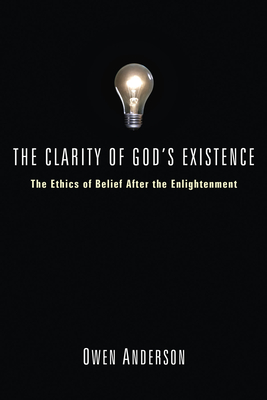The Clarity of God's Existence: The Ethics of Belief After the Enlightenment

The Clarity of God's Existence: The Ethics of Belief After the Enlightenment
The Clarity of God's Existence examines the need for theistic proofs within historic Christianity, and the challenges to these since the Enlightenment. Historically (and scripturally), Christianity has maintained that unbelief is inexcusable. If failing to know God is a sin, the implication is that humans can and should know God. Humans should know God because his eternal power and divine nature are clearly revealed in the things that are made. And yet, Anderson argues, more time is spent on avoiding the need for clarity to establish inexcusability than on actually providing an argument or proof. Proofs that rely on Aristotle or Plato and that establish a Prime Mover or designer are thought to be sufficient. But the adequacy of these, not only to prove the God of theism, but also to prove anything at all, has been called into question by Enlightenment thinkers like David Hume. After considering the traditional proofs, and tracing the history of challenges to theistic proofs (from Hume to Kant and down to the twentieth century), Anderson argues that the standard methods of apologetics have failed to sufficiently respond. Classical Apologetics, Evidentialism, Presuppositionalism, Reformed Epistemology, and others fail to adequately answer the challenges of the Enlightenment. If this is the case, what is the outcome for Christianity? Anderson offers an explanation as to why traditional proofs have failed, and for what is necessary to offer a proof that not only responds to Hume and Kant but also establishes the clarity of God's existence. The traditional proofs failed precisely in not aiming at the clarity of God's existence, and they failed in this because of a faulty view of the goal of Christian life. If the blessed life is to be attained in a direct vision of God in heaven, then there is little to no reason to ask for more than the bare minimum required to get into heaven (justification). Furthermore, if the highest blessing is this direct vision, then the glory of God revealed in his work is considered as less important and even set aside. By way of contrast, if God's eternal power and divine nature are clearly revealed in his works, and the blessing comes in knowing God, then it is of the utmost importance for Christianity to demonstrate the clarity of God's existence.
PRP: 297.60 Lei
Acesta este Prețul Recomandat de Producător. Prețul de vânzare al produsului este afișat mai jos.
267.84Lei
267.84Lei
297.60 LeiIndisponibil
Descrierea produsului
The Clarity of God's Existence examines the need for theistic proofs within historic Christianity, and the challenges to these since the Enlightenment. Historically (and scripturally), Christianity has maintained that unbelief is inexcusable. If failing to know God is a sin, the implication is that humans can and should know God. Humans should know God because his eternal power and divine nature are clearly revealed in the things that are made. And yet, Anderson argues, more time is spent on avoiding the need for clarity to establish inexcusability than on actually providing an argument or proof. Proofs that rely on Aristotle or Plato and that establish a Prime Mover or designer are thought to be sufficient. But the adequacy of these, not only to prove the God of theism, but also to prove anything at all, has been called into question by Enlightenment thinkers like David Hume. After considering the traditional proofs, and tracing the history of challenges to theistic proofs (from Hume to Kant and down to the twentieth century), Anderson argues that the standard methods of apologetics have failed to sufficiently respond. Classical Apologetics, Evidentialism, Presuppositionalism, Reformed Epistemology, and others fail to adequately answer the challenges of the Enlightenment. If this is the case, what is the outcome for Christianity? Anderson offers an explanation as to why traditional proofs have failed, and for what is necessary to offer a proof that not only responds to Hume and Kant but also establishes the clarity of God's existence. The traditional proofs failed precisely in not aiming at the clarity of God's existence, and they failed in this because of a faulty view of the goal of Christian life. If the blessed life is to be attained in a direct vision of God in heaven, then there is little to no reason to ask for more than the bare minimum required to get into heaven (justification). Furthermore, if the highest blessing is this direct vision, then the glory of God revealed in his work is considered as less important and even set aside. By way of contrast, if God's eternal power and divine nature are clearly revealed in his works, and the blessing comes in knowing God, then it is of the utmost importance for Christianity to demonstrate the clarity of God's existence.
Detaliile produsului










